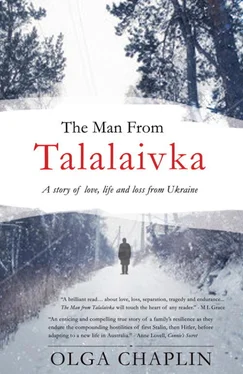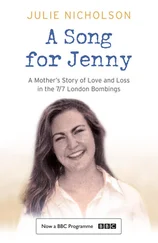Only at the service end did Borys and Katya step forward from the others, their white-ribboned flowers pinned to their lapels. Nadia and Ola, followed by other curious children, stood beside them, their bouquets of wildflowers trembling in their excited fingers. The shortened wedding ceremony still weighing heavily in its significance, brought tears to onlookers’ eyes as the small choir sang its blessings. The couple beamed as Father Mikolaeyev nodded for them to follow him in a tight circle around the altar, signifying the final moments before their union. At last, they kissed the priest’s cross and, bowing their respect, followed him as he addressed the congregation. All were welcome at their barracks block for the wedding festivities.
The rough timber table outside the barracks block, that served the men at casual card games on an odd Sunday afternoon, was now covered in a threadbare but pristine white cloth, as women rushed out with plates of food previously prepared, for all to share. A sweet homemade lemonade was served from a bucket, some local schnapps shared by the men. Katya, in her fine crocheted blouse borrowed from another bride, glowed with happiness, blushing as Borys scooped her to him during the toasts. Peter laughed and shook his head, as someone teased “Horko! Horko!” to the couple for their celebratory wedding kiss.
“Borys, my friend,” he jested, patting the young man’s shoulder, “the sun is still high… you will need to watch the schnapps, if you want to enjoy the moon!” Everyone laughed as the groom blushed, then mock-poured some schnapps to the ground to honour his bride.
Peter drew closer to Evdokia, protectively placing his hand on her shoulder. His eyes followed the neat braids of her hair kept in place with tortoise-shell combs, to her delicate cream silk scarf, constantly mended, both gifts from an early parcel in this Heidenau camp, which she proudly displayed. He leaned closer and whispered in her ear, watched, delighted, as she flicked her eyes at his, a smile teasing her lips. She blushed, distracting herself with the party. Peter savoured the moment, remembered their own nuptials in those difficult times, almost two decades earlier. His heart swelled with pride as he watched his children follow the nimble-fingered accordion player to the grassy field nearby for the bridal party photographs: Mykola’s trousers and jacket already too small for him, as his stature grew, and Nadia and Ola’s hair blowing about in the afternoon breeze as, bouquets held high, they stood excitedly with the bridal party.
“Nadia, Ola,” Peter later sought them out, “I need to take your flowers to the church…” He hesitated. He would wait until morning to give them the news of Elenia’s passing. “Father Mikolaeyev likes your bouquets… he wants to make his church pretty.” Now tiring, they gladly held out their bunches. “Perhaps you could take a flower or two to Katya and Borys, for them to keep?”
They ran off to the couple with their selected flowers. Peter nodded to Evdokia, knowing she understood his purpose. He walked the short distance back to the barracks block, where the accordionist and party were in full voice, and continued on to the far end of the camp to the church, the simple wooden painted cross above its door its symbol of Orthodoxy. The door was closed, but unlocked. His eyes adjusting to the dim light, blinking at the candle haze that still hung in the air, he made his way to the altar, now devoid of its ecclesiastical robing, revealing its simple timber planks of a hand-hewn table. He arranged the flowers along its length, placed the pure-white lily with its long stem at table’s end. Tomorrow, the plain plank table would touch other hand-hewn planks, of a child’s coffin, the child’s porcelain-white face would be embraced by this pure-white lily, also cut too early, before its prime.
Peter stood back, head bowed as he said a silent prayer only known to his soul, of the enduring love he held close, deep in his heart for his young lost loved ones: Hanya, Mischa, Manya.
The tears fell over the lily, slipped down to its stem, to its heart that once existed. “Charstvo Nebesno,” he whispered. “May we all be together, one day, if our God wills it.” He shuffled his feet, to stir himself from the deep moment. A clump of clay broke from his worn boot. He picked up the clod, symbolically kissed it and placed it next to the lily, remembering another clod of clay that had been left all those years ago, in his Kylapchin village cemetery. What had to be, had to be, his heart had told him. And so it was. He crossed himself once more, stepped back from the altar, closed the church door. There will be time enough for more tears in the morning. The rest of this day was still one for the celebration of life, of love, of joy. Today’s celebrations reminded him our hearts needed only to look about us, to find it so.

Chapter 35
“Herr Pospile…” the UNRRA official looked up from his documents and beckoned Peter to the chair opposite his desk. Peter nodded in respect and glanced about him. This cramped room, adjacent to the camp commandant’s office, but now with its walls stripped of paraphernalia, felt clinical, reflecting the sombre tone of the German officer. There was no hint in his demeanour for Peter to gauge which side he supported: the old Germany under Hitler, the Western Allied Occupation forces or, now, the newly developing administration that would soon emerge as the German Federal Republic.
Peter tried to take a deep breath to prepare himself, but his chest felt as if it was being crushed by a suffocating weight, the enormity of this meeting almost submerging him. All his preconceptions for this interview were suddenly swept aside. He realised in that singular moment that, except for one vital fact, honesty was his best ally. Pulled in both directions, afraid of his own ability to fully convince the UNRRA official at this sunset stage of Germany’s migration proceedings, he thought of his little family, so dependent on him, and forced himself to remain composed, convincing.
The official laid out his documents in careful order. It was more than orderly, somehow almost a method of entrapment. Peter suddenly realised that this man may well have been trained in Germany’s secret service. There was something unnerving in the way in which he scrutinised the documents, ran his eye over this one, then another, then back to yet another, looking for inconsistencies, untruths.
In spite of himself, Peter watched, intrigued, trying to gauge the officer’s thoughts. “This man is trained to watch for serious offenders,” he thought to himself. “Traitors, collaborators… people with stolen identities still trying to escape the clutches of the administrative police.” It was possible, in post-war Germany, that some of them could still be within the boundaries of this camp, unwittingly protected by others.
He drew a deep breath, and waited. Whatever the cost, he would take his chances with the one vital deviation from the truth. He could not contemplate being sent back to Stalin’s Russia. Already, Stalin’s much-altered NKVD had a new arm to its iron fist in the form of Smersh, the aptly named acronym of ‘Smert Shpionam’—‘Death to Spies’, extending its poisonous tentacles so far that even in Heidenau camp the waiting inmates froze in fear. The pretexts for Smersh’s stamp of ‘traitor’ that led straight to Stalin’s labour camps were spurious, but the consequences deadly: forcible removal by enemy forces from Russian or Ukrainian soil, even temporary, placed the interrogated under permanent suspicion.
Читать дальше













